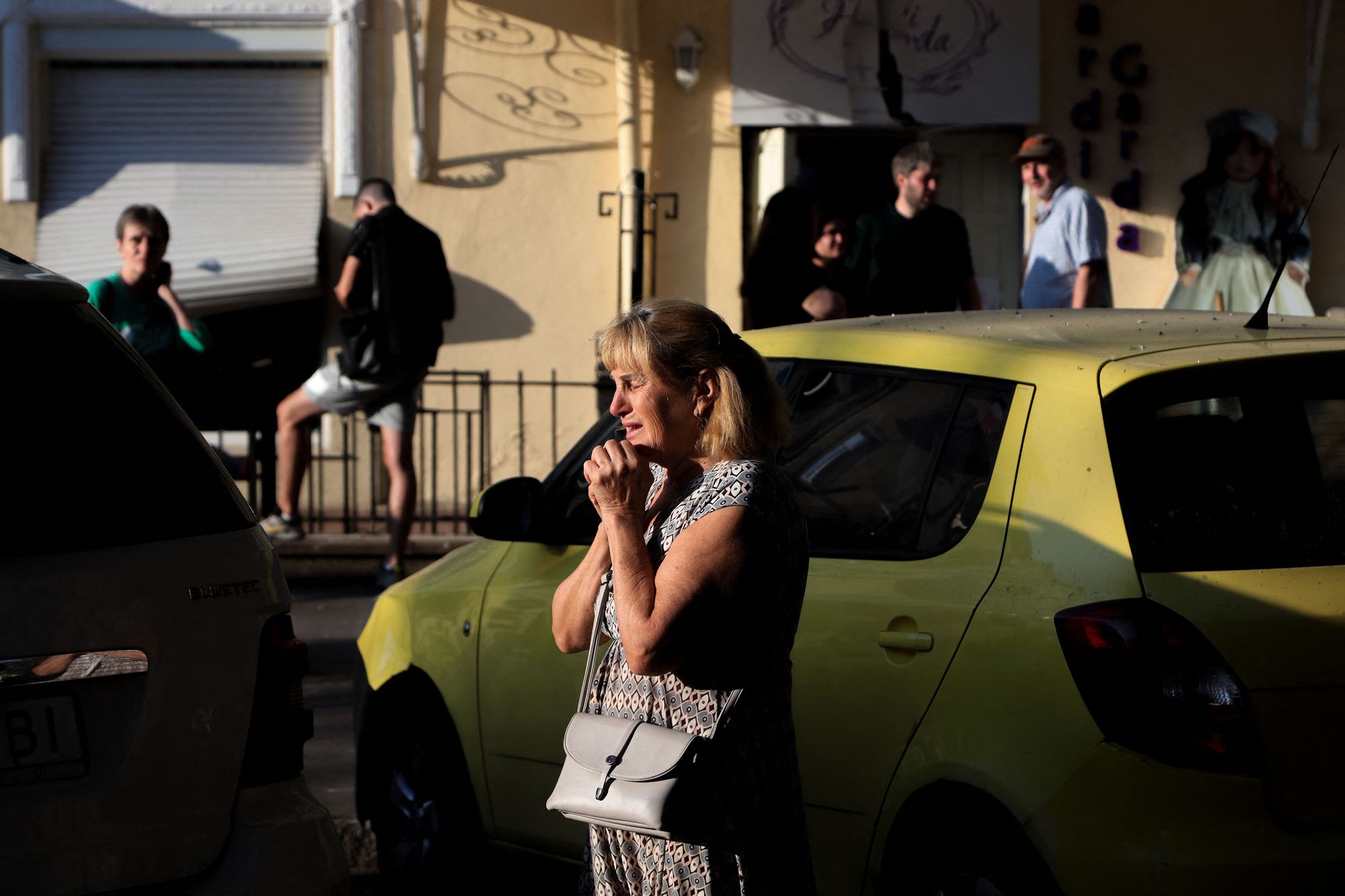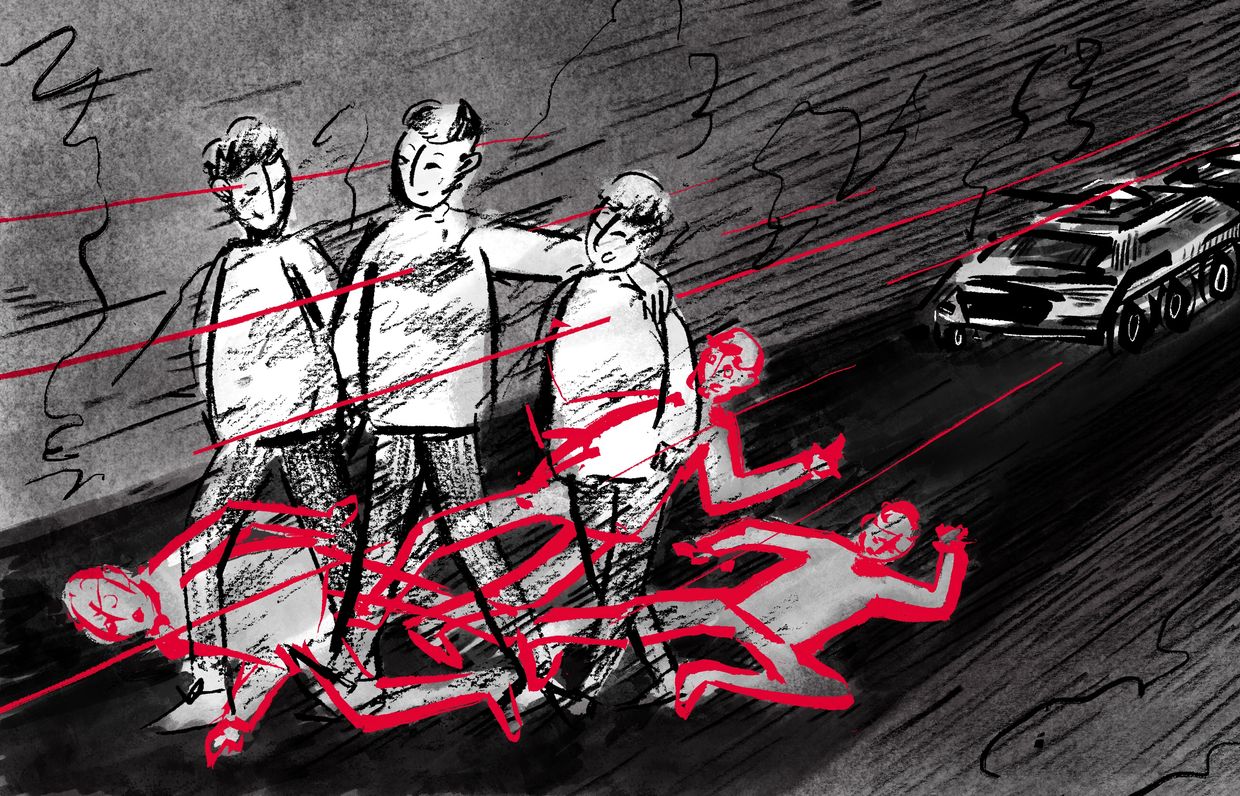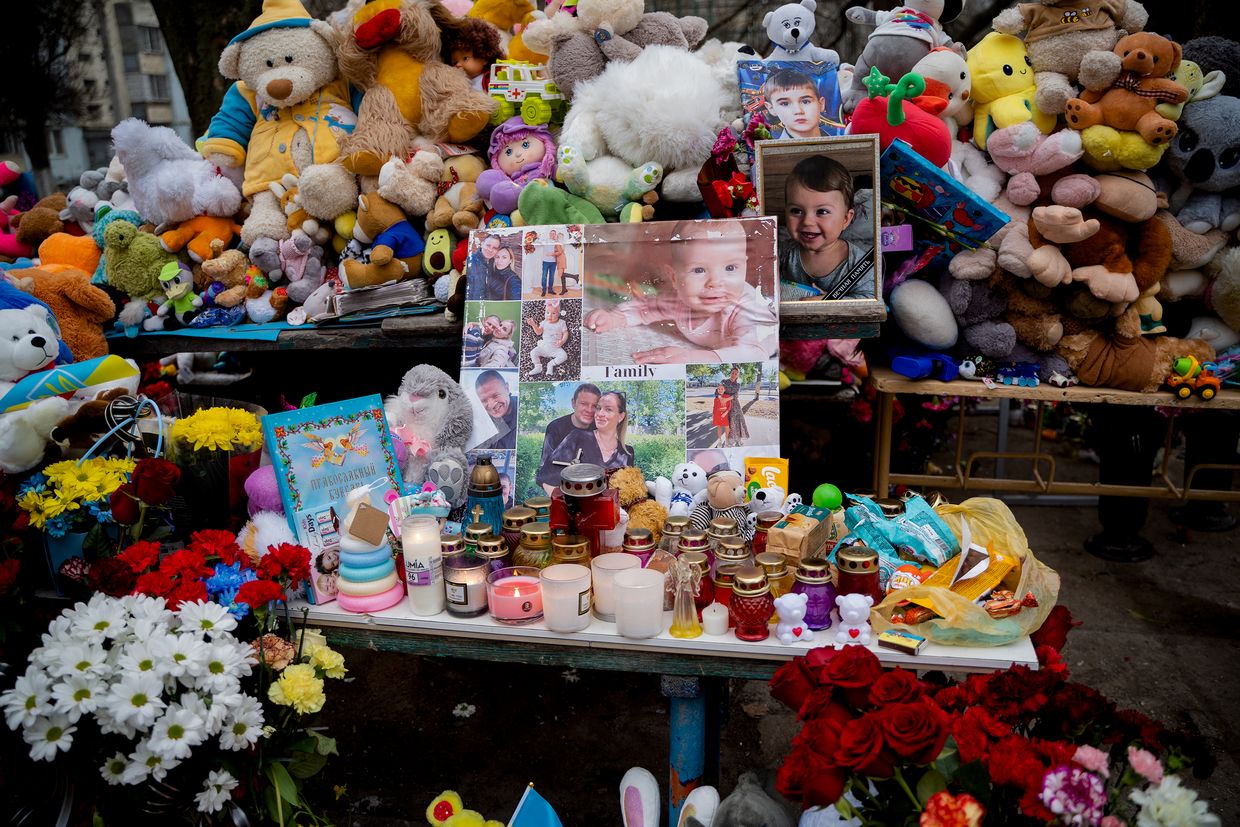How thousands of Ukrainian children cope with losing parents to war

Editor's Note: The Kyiv Independent spoke with children under the permission of one of their surviving parents.
At the age of 11, Arina Pervunina saw Russian troops killing her father.
She and her younger brother were caught behind enemy lines at their grandparents’ house in Kherson Oblast shortly after the full-scale invasion started, while their parents were at home in Odesa.
In the early weeks of the invasion, Arina’s father came to rescue his children and the girl’s two cousins from the Russian-occupied part of Kherson Oblast. They were in their car when Russian soldiers began firing at them.
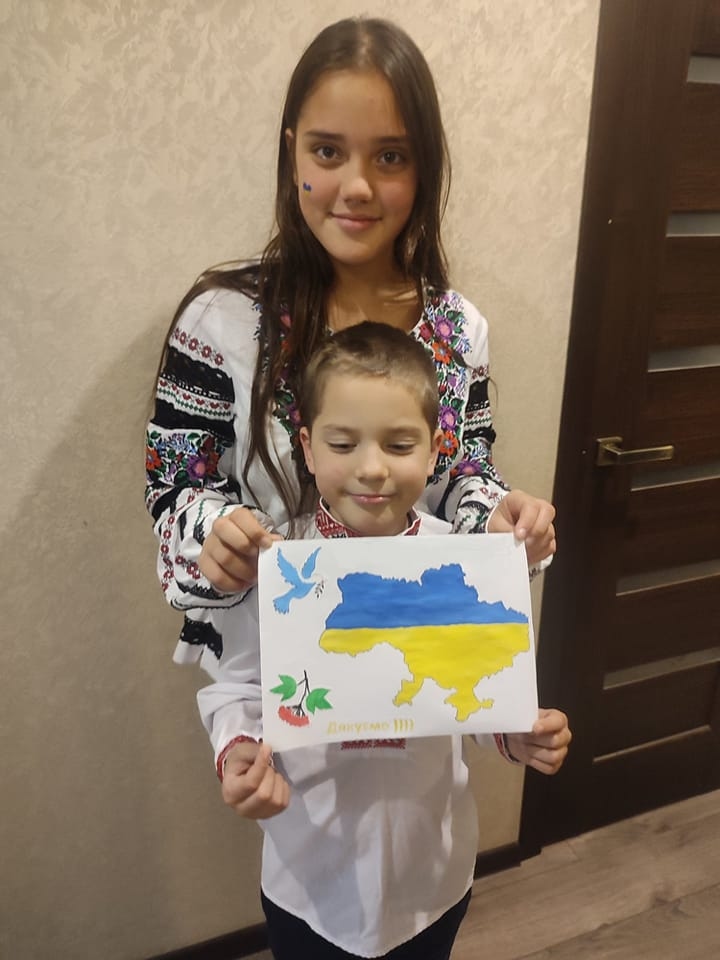
Seventeen bullets hit Arina's father, Andrii Pervunin. One of Arina’s cousins survived only because he was holding a dog that took a bullet and was killed instantly.
The Russian troops kept the children at their checkpoint for over an hour, dragging them along the ground and swearing at them before letting them go with other Ukrainians fleeing the occupation. Arina's father was taken to nearby Mykolaiv in the trunk of a car.
"He was given first aid, but we couldn't save him," Arina, now 13, told the Kyiv Independent.
To cope with the loss, she began writing letters to her father shortly after the tragedy. Foreign Minister Dmytro Kuleba read one of Arina's letters at the United Nations General Assembly in July 2023.
"One week after the tragedy she wrote in her diary … 'I don't want to live. What is this life without father?'" Kuleba said.
"These lines are impossible to read without tears," Kuleba added. "These are only the lines I managed to bring, but there are thousands of children like this who are going through the same suffering."
Russia's full-scale invasion has indeed taken a devastating toll on Ukraine’s children: Almost 600 children have been killed, and over 1,200 injured across Ukraine.

Almost 1,800 Ukrainian children have been made orphans by the war, the National Social Service of Ukraine said in a comment to the Kyiv Independent. Many other kids have lost a parent to the Russian full-scale invasion, like Arina, as at least 10,000 civilians and 31,000 Ukrainian soldiers have been killed since 2022.
At a young age, these children have to learn to cope with the loss and live without their parents' support.
While the loss of parents affects kids at any time, when experienced during war, the resulting trauma can worsen mental health challenges, making the overall impact on children even greater, says Ukrainian psychotherapist Marta Bilyk.
"Some children have to pull their parents out of shot-up cars or even dig (their bodies) from under the rubble of collapsed houses," Bilyk, who works at the Children of Heroes foundation, told the Kyiv Independent.
"The worse a parent's death is, and the more a child knows about it, the harder it is for them."
Children of war
Even children who have not suffered the loss of a direct relative due to Russia's brutal invasion have been robbed of a peaceful childhood, turning a whole generation into "children of war."
"We thought that the term 'children of war' had already passed and gone, but now we have children of war again," says Bilyk. "It includes those experiencing loss at a very young age, and fearing for one's own life and the lives of loved ones – which shouldn't be typical for children of this age."

According to the United Nations children's agency UNICEF, the war has had a "devastating impact" on children's mental health and well-being, with an "estimated 1.5 million (Ukrainian) children at risk of depression, anxiety, post-traumatic stress disorder, and other mental health issues, with potential long-term effects and implications."
Losing parents is among the worst outcomes of the war for children.
The grief can cause a child to lose interest in society and stop sharing their feelings with others. In some cases, the "intense sorrow" may cause "depressive symptoms, complete apathy, and a loss of interest and ability to learn," says Bilyk.
"Some children say, 'I want to be where dad is. I want to go after dad.' In acute cases, they may even have certain suicidal thoughts," she says.
Apart from the devastating effect on mental health, losing one or both parents may also lead to financial struggles and a deterioration in the overall quality of life for some families.
Bearing the responsibilities of two parents while coping with a painful loss is not easy, as Kyiv resident Nataliia Motorna can attest: Her husband of over 20 years, Illia, was killed during a combat mission in Sievierodonetsk, Donetsk Oblast, in late May 2022.


She says that the life she knew – full of laughter, joy, love, and adventures – ended the day she learned about her husband's death. Instead, she and her children, 12-year-old Varvara and 17-year-old Matvii, suffered unimaginable pain from their loss.
"When I found out about it, I began screaming at the top of my lungs," Motorna recalls. "I thought I would go completely insane."
But amid the unbearable pain of loss, Motorna had to step up and replace her husband as the primary provider for the family.
"I told the kids: 'You should know that I am terrified, that it hurts me very much, but you should also know that I won't do anything to myself, because now I’m alone (looking after) the two (of you),'" Motorna says, trying to hold back tears.
Still, suffering their father’s loss themselves and seeing their mother in such a vulnerable state immediately made Matvii and Varvara grow older and stronger, their mother says.
Children of heroes
The Ukrainian government currently pays Hr 5,680 ($143) per month for children under six who have lost their parents, and nearly Hr 7,000 ($177) for children aged 6-18. Children with disabilities whose parents have been killed can get over Hr 9,000 ($228) from the government per month, according to the National Social Service.
Family doctors can provide the families with free psychological help, alongside other social benefits.
But with the huge amount of suffering that the Russian war has brought, and continues to bring, it might be challenging for the state to support each and every child in need.
Luckily, charities step up as well.

From another widow, Motorna learned about the Children of Heroes foundation, which has been taking care of kids who have lost their parents to the full-scale invasion since March 2022, offering them psychological, legal, and humanitarian support.
The foundation currently has almost 8,000 children in its support program, with the majority of them, or 88%, being children of fallen Ukrainian soldiers.
It was the foundation that provided Kuleba with Arina’s letters to her father, and it also found a psychologist for her and sent her to a summer camp in Spain with other Ukrainian children who have suffered the loss of a parent.
"It helped me a lot, as I realized how to live with this trauma, and saw children going through the same, or even something worse," Arina says.
Hanna Khomenko, the foundation's head of the department for working with children, says the charity also provides each family with a personal assistant, a mentor, who often contacts them to check their psychological state and learn about their needs.
"It's about our impact on our future," Khomenko says. "We thought about how these children would cope with their loss without a supportive community."
Motorna agrees: "It's crucial when someone cares… When someone doesn't forget about you," she says.
Inspiring the future
The foundation's "strategic goal" is to support children until they reach the age of 18, Khomenko says.
"We try to find out what the child wants. Our aim is to help them build a path to achieving their goal. (We) try to do everything so that every child who receives help from our foundation, in 10 or even 18 years, is incredibly satisfied with their life."
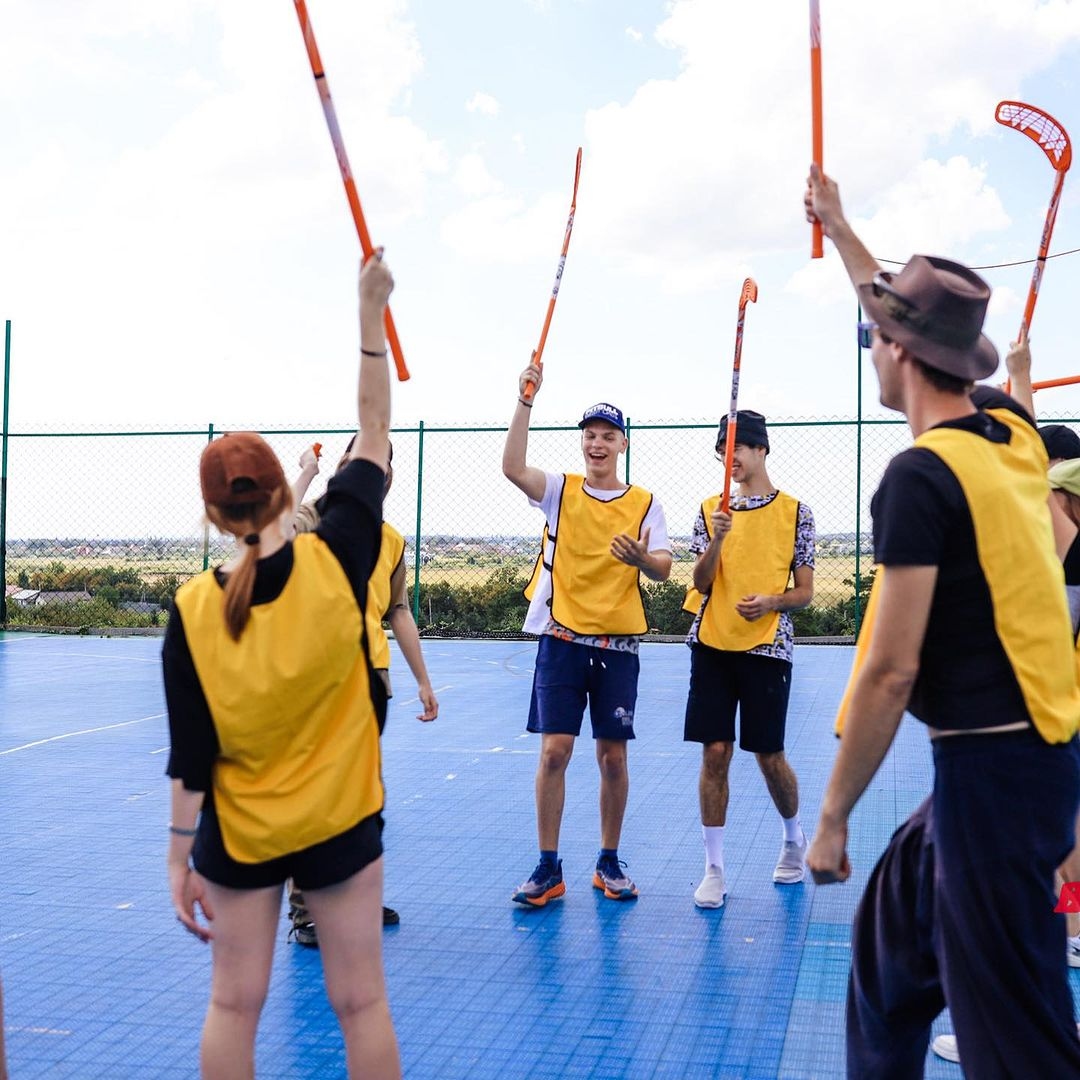

To achieve that, Children of Heroes provides kids with various educational courses, including English and mathematics, and arranges camps and workshops for them.
However, inspiring children might be their most significant contribution to their future.
And giving them a chance to communicate with Ukraine's high-ranking officials and see the world is part of that contribution.
Last year, Varvara and Matvii attended a meeting with Kuleba, where they got a chance to chat with the foreign minister, which was "very motivating," according to the two.
Seven-year-old Iryna Vasylieva from Rivne has been dreaming of sending a letter to the former U.K. Prime Minister Boris Jonson for a while. She wanted to ask the official where she could purchase Javelin anti-tank missiles for her late father's battalion.



Iryna's father, Ukrainian soldier Oleksandr Vasyliev, was killed in combat in Mykolaiv Oblast in late March 2022. Shortly after his death, she began selling handmade wreaths and raising funds to support her father's comrades in arms.
Although she has already provided the battalion with several cars, thermal imagers, and other equipment, Iryna says getting them Javelins has been a long-time dream for her. Thanks to the foundation, she has recently handed a letter to Kuleba, asking him to give it to Johnson.
"She wrote to him (Johnson) that she is a volunteer, and that her father protects her from heaven, but his fellow soldiers need a lot of equipment to continue fighting," says the girl's mother, Viktoriia Vasylieva.
"I am eagerly awaiting his response," Iryna told the Kyiv Independent. "I dream of victory and of buying a Javelin."

"These are the little things that inspire children, inspire us to move forward and do what we do, but with greater force," says Khomenko.
Arina says she still misses her father every day and knows nothing could ever ease her pain, but she is learning to live with her loss and has not stopped dreaming.
After visiting a camp in Spain last summer, she decided she wanted to study there to become a doctor.
"Then I want to return to Ukraine to treat older people, so that children like me never feel the pain I felt (by losing their parents)," Arina says.
Note from the author:
Hi! Daria Shulzhenko here. I wrote this piece for you. Since the first day of Russia's all-out war, I have been working almost non-stop to tell the stories of those affected by Russia’s brutal aggression. By telling all those painful stories, we are helping to keep the world informed about the reality of Russia’s war against Ukraine. By becoming the Kyiv Independent's member, you can help us continue telling the world the truth about this war.


